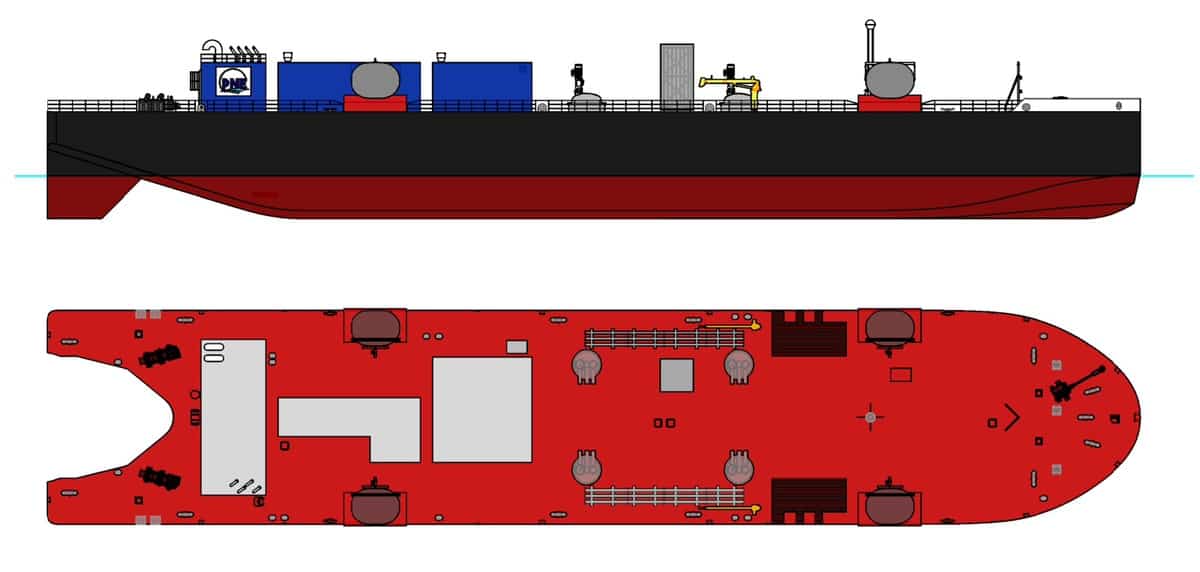NorthStar Midstream, a company that is 50% owner of the JAX LNG terminal in Jacksonville, FL, is expanding into the marine bunkering business, targeting operators of cruise and cargo ships that are planning to use natural gas as bunker fuel.
Northstar, which is owned by investors in funds managed by Oaktree Capital Management LP, has formed a new company, Polaris New Energy, which has ordered an LNG barge that will be built at the Fincantieri Bay Shipbuilding yard in Sturgeon Bay, WI. The barge is scheduled for delivery at the end of 2021.
The barge will have capacity of 5,400 cubic meters (cbm) of LNG stored in four 1,350-meter tanks. The barge will be 340 feet in overall length, have a beam of 66 feet and a draft of 32 feet, 10 inches. The cost of the barge was not revealed.

Tim Casey, senior vice president of LNG at Northstar, said the company plans to load fuel on the Polaris barge at the JAX LNG terminal. Two container carriers that call Puerto Rico, TOTE and Crowley, operate LNG-powered ships between San Juan and Jacksonville.
TOTE Maritime Puerto Rico has a smaller, 2,200-cbm barge that it uses to fuel its ships, while Crowley directly bunkers its ships from fuel lines at its terminal. Casey explained that many companies that operate or plan to operate LNG-powered ships prefer to bunker from barges because using shore lines may restrict loading or discharge of cargo or passengers in certain areas on dock for safety reasons.
He said Polaris is aiming to use the barge to fuel ships in Port Canaveral and the Miami/Port Everglades area. He said Jacksonville is a good place for an LNG terminal because there are pipelines in the vicinity delivering the quantities of gas needed for a liquefaction facility.
Numerous cruise companies are operating or building LNG-fueled ships including Carnival (its Aida, Costa and Carnival Cruise brands), Disney, Royal Caribbean, MSC Cruises, TUI, Hurtigruten, Norwegian Yacht Voyages and Ponant. Casey said it typically takes 1,500 to 2,000 cbm to fuel a cruise ship.
Casey said Polaris also plans to fuel cargo ships and would like to build additional barges that would fuel ships in other coastal ranges or inland waterways in the U.S.
NorthStar’s agreement with Fincantieri gives it the ability to potentially construct two sister barges.
Utilizing a suitable tugboat, the barge will operate as an articulated tug and barge unit. Polaris has not chosen a tug operator or decided whether it will operate a tug itself.
According to Steve Cadden, the chief operating officer of SEA/LNG, an industry group that promotes the use of LNG as marine fuel, there are 168 LNG-fueled ships in operation today and another 177 on order. In addition, there are 141 “LNG-ready” ships — dual-use vessels that could be converted to run on LNG. (These numbers do not include ships that actually transport LNG, which commonly use “boiled-off” cargo as fuel.)
The number of barges used to bunker LNG ships also has grown dramatically from just one in 2017 to nine at the end of last year. More than 30 are expected to be in operation within two or three years, said Cadden.
VT Halter Marine is constructing a 4,000 cbm LNG articulated tug and barge unit with Quality Liquefied Natural Gas Transport, LLC (Q-LNG) that is due for delivery in the first quarter of 2020. Last year it reportedly executed a letter of intent to build a second 8,000 cbm LNG barge. The barges will be chartered to Shell. Shell is supplying LNG to Carnival.
While ferries and cruise ships are the most common type of LNG-powered ships, a wide variety of other sorts of vessels — roll-on, roll-off ships, container ships, product tankers and bulkers — that use LNG as fuel.
Casey said the new barge will expand Northstar’s ability to deliver LNG fuel “in both an economical and safe manner. As domestic natural gas continues to rise, LNG has quickly become both a clean and competitively priced fuel alternative. We see increased domestic industries looking to LNG as their future fuel source.”







